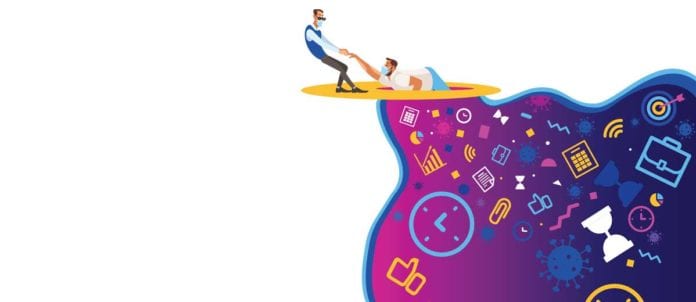The restaurant industry — and all those who depend on it for their livelihood — have been facing an unprecedented change during the COVID-19 pandemic. The resulting financial stress, isolation and uncertainty can quickly take a toll on their physical and mental health.
In a recent webinar hosted by Restaurants Canada, Fair Kitchens and Unilever Food Solutions, experts weighed in on best practices for managing stress and mental health during the COVID-19 pandemic.
Moderated by Roborto Sarjoo, director of Marketing and Brand Communications, Restaurants Canada, the panel included Liz Horvath, manager, Workplace Mental Health, Opening Minds, Mental Health Commission of Canada; chef Kees Van Erp, global executive chef, Unilever Food Solutions; and Hali VanVliet, senior manager, Human Resources Advisory, BDO Canada.
“As restaurant operations are restricted to delivery or takeout and, in many cases, are closing their doors entirely, [we’re examining] the latest impact of Coronavirus on the foodservice industry in Canada and our panel will share their insights on managing through change, controlling stress and preserving mental health in this new reality,” said Sarjoo, adding most of the world is facing this global pandemic and “while we’re all searching for answers in terms of what we can do, this can really take a toll on a person, not only physically, but mentally.
So, it’s important that we do have this conversation.”
Research from Technomic predicts that in 2020, foodservice sales will be down 12 to 27 per cent, depending on recovery. It also shows full-service restaurants that can’t adapt to the delivery and/or takeout model, as well as hotels or leisure-based business, will be hit even harder.
Sarjoo stressed that mental health was already a global issue within foodservice prior to COVID-19, citing research that shows 63 per cent of chefs worldwide report suffering from depression, 53 per cent feel they’re pushed to the breaking point, 60 per cent of young chefs feel there are limited possibilities for career progression and 74 per cent of foodservice staff feel sleep-deprived to the point of exhaustion.
In her human-resources role, VanVliet said she spent the majority of her time in the early days of COVID-19 being a sounding board for clients “trying to develop their own processes, procedures and options and [determining] how they’re going to deal with this crisis — not only for themselves and their business, but for their employees.”
Workers in the foodservice industry have been blindsided by the loss of revenue and jobs — as well as the associated stress – as a result of COVID-19. According to Horvath “one of the first things we need to do is to acknowledge people’s feelings and fears and remember we’re having a normal reaction to a very abnormal situation. We’ve never seen anything quite like this before and fear is an emotion that clouds our thinking,” she said, adding we have to acknowledge that fear and the fact we want to help people shift what they’re focusing on, “so they’re focusing on the fact we’re going to get through this. We also need to remind them their physical and psychological health and safety is important. In fact, it has to be a priority.
And reminding people that providing that psychological protection for themselves and for their employees is important.”
As we’re carrying out this exercise in physical distancing, she said we need to “remind our customers and staff, as well as ourselves, that physical distancing is important. It’s part of the health and safety of our employees and also of our customers. And yes, it really is a shift in the way we’re working.”
Horvath also pointed out that, while trying to shift the focus from fear to solutions, operators should be aware there are good resources and credible sources of information available to help. “So, focus on the credible sources of information rather than those that thrive on fear mongering.”
Coping in Uncertain Times
Van Erp reminded listeners that although the industry cannot solve broader challenges such as financial losses and job cuts, it can offer support.
“The personal connection is super important,” he said, citing global examples of chefs and operators setting up networks to field questions and concerns related to COVID-19. “The most important things right now are empathy, support and being there for each other. Maybe you can’t be there physically, but you can, with the technology we have today, stay close with others.”
From an HR perspective, VanVliet’s advice to restaurant owners is to develop some sort of communication plan. “It doesn’t have to be elaborate and it doesn’t have to be in a document, but it’s a plan to communicate with your employees,” she explained. “So, who you need to communicate with, how often you need to communicate and what method you’re going to use for communication. It’s super important to ensure the contact information you have for these individuals is up to date, that you know how to get in touch with them and, alternatively, how they can get in touch with you.”
“It’s amazing how much a ‘hey, how are you doing’ can make a difference in someone’s life,” agreed Sarjoo.
So how can open and compassionate conversations between owner/operators and staff be both encouraged and facilitated, especially when people are feeling uncertain and have limited experience in managing fear and the unknown?
According to VanVliet, it begins with understanding there’s fear and uncertainty in those people who are still working for you, “simply because they’re out of their element, doing something they may not have done before. And then there may be fear,
especially for those individuals who have always been in the workplace and not been out, [for example], delivering or doing other tasks. [An employer’s] number-1 responsibility is helping them with the expectations. Number two, we’re all in this together, so if you’re not certain, ask questions,” she said, adding if employees are nervous or unsure about health-and-safety practices, then having those conversations is of paramount
importance.
“People underestimate how stressful it can be to be put in a new role,” she continued. “You may have been working with the restaurant for years, but to be doing something totally different can push you outside of your comfort zone, on top of all of the other changes that may be going on personally for you with respect to this crisis. It can amount to real uncertainty and fear in individuals.”
Horvath reiterated the importance of utilizing technology to stay in touch when people are feeling vulnerable to stress. “Doing those check-ins is absolutely critical. And those can be done by phone or by video calls, but checking in with people and understanding there are a number of people experiencing increased levels of stress right now, and that stress can [wreak] havoc on someone who is already struggling with something like anxiety or depression. is important.”
She said employers also need to provide information to employees regarding access to employee-assistance programs and benefits. “And if you do, you should know what those benefits are, so that you can guide people to them, because they there could be no coaching or counseling or other benefits that can help them through this time. But for
organizations that maybe don’t have access to an EAP program or benefits, you need to know what community supports you can point people to to help them through.”


















